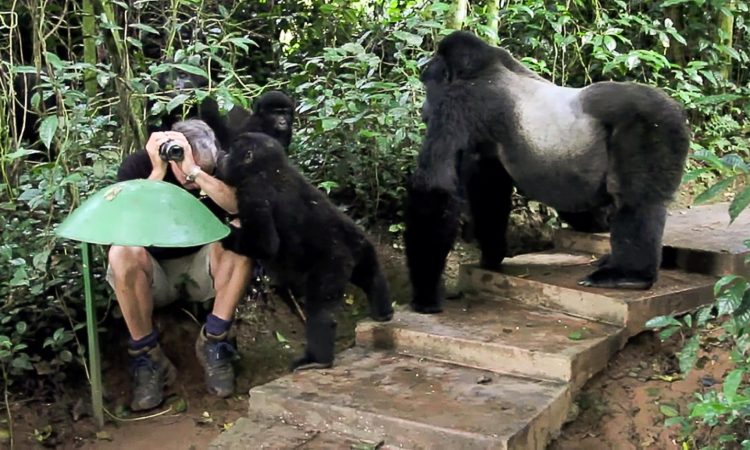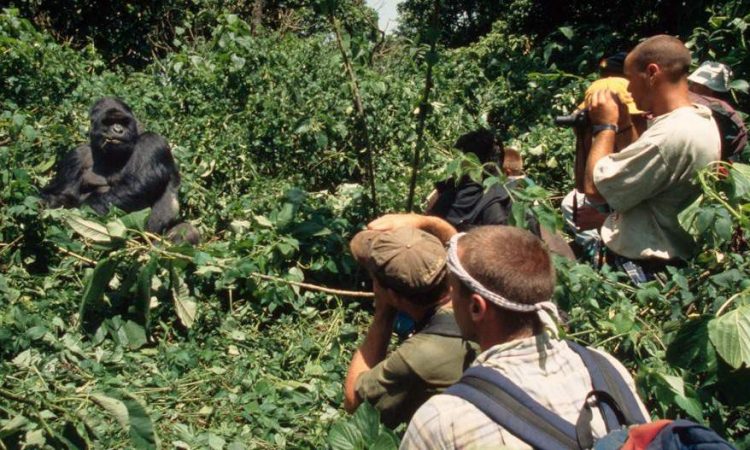Gorilla Habituation in Bwindi Impenetrable National Park
Gorilla habituation in Bwindi Impenetrable National Park in Uganda is one of the top activities done in Uganda as travelers spend more time exploring the endangered gorilla species. For tourists interested in seeing the gorilla species they can participate in gorilla trekking in Bwindi impenetrable national park where they will track the different habituated gorilla groups in the different sectors of the park namely Nkuringo, Ruhija, Buhoma, and Rushaga.

It should be noted gorilla trekking in Uganda involves tracking a number of habituated gorilla families which is not the case for the gorilla habituation in Uganda which involves tourists participating in the process of exposing the mountain gorillas to humans presence as a way of them to stop responding to human presence thus getting accustomed to their presence and hence being ready for them to be tracked by tourists.
Gorilla habituation in Bwindi Impenetrable National Park
Gorilla Habituation in Bwindi Impenetrable National Park is currently carried out in the Rushaga sector in the southern part of the park. For every gorilla family that is under habituation, a group of 4 people are allowed to participate in the process and only four permits per gorilla family are issued to participate in the gorilla habituation process. Gorilla habituation in the park takes a period of 2- 4 years for the gorilla families to get used to human presence however this can even take more time depending on the gorilla family that is being habituated and their behavior.
Price of a gorilla habituation permit
Unlike gorilla trekking in Uganda where a gorilla trekking permit in Bwindi impenetrable national park is only for a fee of 600USD, a gorilla habituation permit in Bwindi Impenetrable National Park can be got at a fee of 1500USD and this can be got from a trusted tour company, Explore Rwanda tours or from the Uganda Wildlife Authority.
Added benefits of gorilla habituation
- Take part in the process other than just observing
- You will get to spend Four hours observing how the gorillas in the park behave, how they respond to the training, their co-existence with one another and the trackers before they are accustomed to human presence which is an interesting observation
- Take part in training the gorilla families other than observing the gorilla groups like in gorilla trekking.
- While hiking to the different gorilla families in order to carry out gorilla habituation, you will see a number of primate species like the red tailed monkeys, black and white colobus monkeys, mona monkey, vervet monkeys among other primate species
- You will also get the chance to see a number of bird species during the hike to the gorilla family that is meant to be habituated. And because Bwindi Impenetrable National Park is a home to 348 bird species, you will get to see a number of bird species like; shrike flycatcher, brown crowned tchagra, hairy breasted barbet, red-faced crimson, white thighed hornbill, black bee eater, green breated pitta, yellow billed barbet, white-bellied crested flycatcher among other bird species.
Guidelines of gorilla habituation
- You should follow the lead of the trackers and the rangers in order to have a safe activity while in the park.
- Getting intoxicated in the presence of the gorilla is highly prohibited for example smoking is not allowed because it can spread diseases among the primates
- Unnecessary noise in the park during gorilla habituation in Bwindi Impenetrable national park will trigger the mountain gorillas as threats which can lead to their attacks.
- Eating in the presence of the gorilla is also not allowed in order to avoid the contraction of diseases.

Packing list
- A Camera should not miss out on your packing list in order to capture the beautiful moments of the primates during gorilla habituation in Bwindi Impenetrable National Park.
- A Raincoat because the weather in the park is quite unpredictable which can rain time in the park.
- Long sleeved shirts in order to avoid being pricked as scratched by nettles.
- Hiking boots for easy mobility while in the park.
- Insect repellent should not, miss out on your packing list because the park is a habitat to a number of diseases spreading diseases like mosquitoes, black flies among other insects that can cause irritation and spread diseases while in the park.


